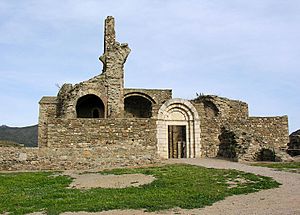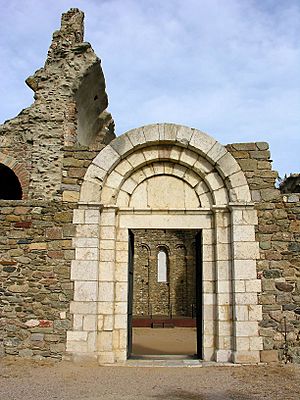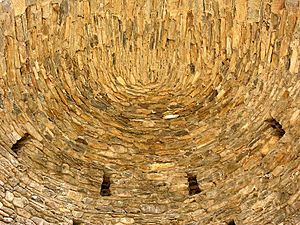Santa Maria, Roses facts for kids
The Santa Maria de Roses is what's left of an old Benedictine monastery in a town called Roses, in a region of Catalonia, Spain, known as Alt Empordà. It's found inside the Ciutadella de Roses, which is a big fort in the Province of Girona. This monastery is special because it's the very first place in Spain known to show the Lombard style of building.
Contents
History of Santa Maria de Roses
The monastery started as a church named Santa Maria de Rodes. This church belonged to another monastery, Sant Pere de Rodes. The monks at Santa Maria de Roses often faced attacks from Saracen pirates, which made their lives difficult.
Early Days and Protection
In the year 960, a powerful leader named Gausfred I, who was the Count of Ampurias and Roussillon, offered to protect the monks. This helped them feel safer. Later, in 976, the monastery gained important rights. They were allowed to fish in the local waters and claim goods from shipwrecks. This helped them get food and other supplies.
The official document that started the monastery was written in 1022. Santa Maria de Roses also had smaller churches or communities that were part of it, like Santa Maria de Pedardell and Santa Maria del Camp.
Decline and Destruction
The monastery began to have problems in the 1400s. In 1588, a terrible sickness, a plague, caused the monks to leave their homes. The monastery was then robbed. A few years later, in 1592, the Pope ordered that Santa Maria de Roses join another monastery called Santa Maria d'Amer.
The monks finally left for good in 1792. The very next year, in 1793, soldiers from Napoleon's army destroyed the building. Much later, between 1966 and 1969, some parts of the monastery were repaired and brought back to life.
Architecture of the Monastery
The monastery was built following a basilica plan. This means it had a long central hall, called a nave, with two smaller halls on either side. It also had a transept, which is a part that crosses the main hall, making the building look like a cross from above. At the end, there were three rounded sections called apses.
Inside the Building
The main hall had a rounded ceiling, known as a barrel vault. You can still see some of the Lombard decorations on the inside walls. These decorations often include a series of "blind arches," which look like arches but are filled in and don't lead anywhere.
Other Structures
There are also parts left of a cloister, which is a covered walkway usually found in monasteries. It often surrounds an open courtyard. Some other monastic buildings, where the monks lived and worked, also have remains. A big project to restore these old parts started in the late 1900s.
Abbots of Santa Maria de Roses
The abbots were the leaders of the monastery. They were in charge of the monks and the daily life there. Here are some of the abbots who led Santa Maria de Roses over the centuries:
| Number | Name | Period |
|---|---|---|
| 1 | Llunesi | 960? |
| 2 | Guifré | 976 |
| 3 | Sunyer | 976-995 |
| 4 | Sunifred | 1008 |
| 5 | Adalbert | 1020-1022 |
| 6 | Ponç | 1040 |
| 7 | Ecard | 1046 |
| 8 | Ramon Hug | 1050-1064 |
| 9 | Deodat | 1070-1083 |
| 10 | Adalbert | 1093-1095 |
See also
 In Spanish: Monasterio de Santa María de Rosas para niños
In Spanish: Monasterio de Santa María de Rosas para niños
 | Janet Taylor Pickett |
 | Synthia Saint James |
 | Howardena Pindell |
 | Faith Ringgold |




